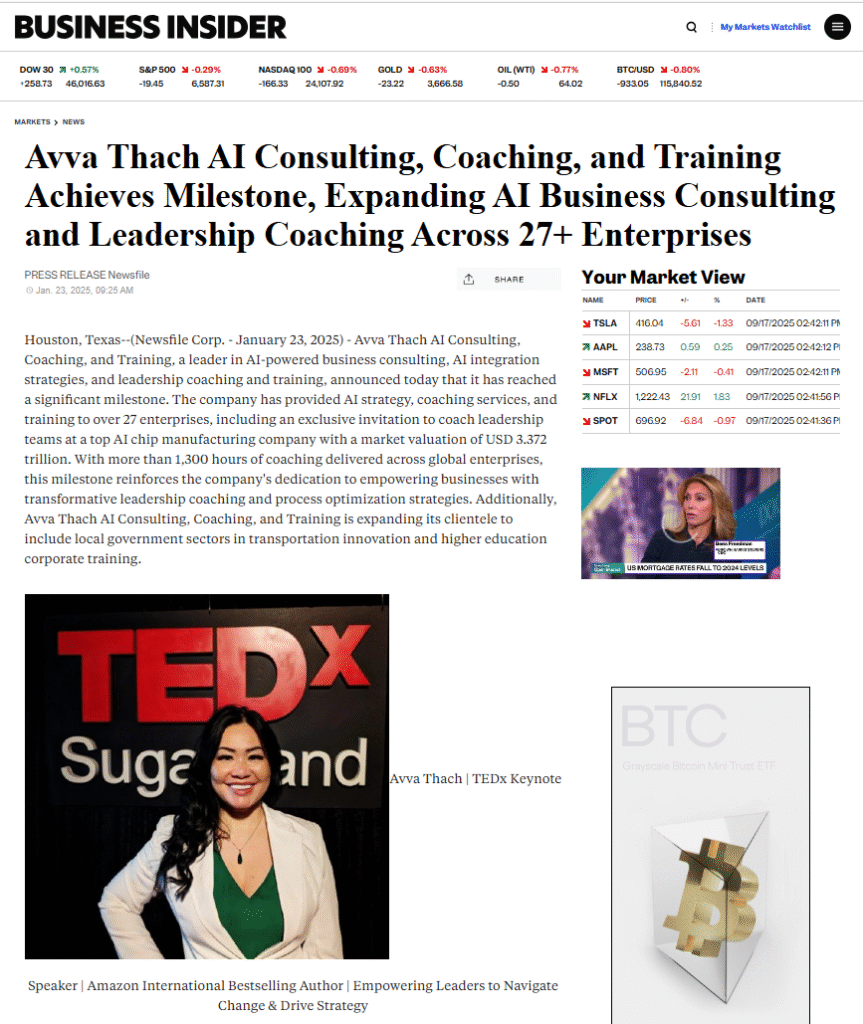Essential Leadership Coaching Skills for the AI Era
Introduction
Welcome to the future of leadership, where the landscape is changing faster than a TikTok trend! In this AI era, the skills required for effective coaching in leadership skills are evolving at lightning speed. If you thought leadership was just about making decisions and delegating tasks, think again! Today, it’s about navigating complexities with finesse and fostering a culture that thrives on innovation.
As organizations dive headfirst into digital transformation, the need for leadership coaching has never been more critical. With 93% of companies currently undergoing digital transformation (International Data Corporation), leaders must possess the right tools and techniques to steer their teams through uncharted waters. This post will explore essential coaching in leadership skills that will not only help you survive but thrive in this brave new world.
But hold on what exactly does it mean to coach leaders effectively in an age dominated by technology? Spoiler alert: it’s not just about pushing buttons or crunching numbers. It’s about developing emotional intelligence, enhancing communication strategies, and mastering conflict resolution like a pro. So grab your favorite beverage, get comfy, and let’s dive into the nitty-gritty of what makes a leader truly exceptional today!
Key Takeaway: Effective coaching in leadership skills is essential for navigating the complexities of the AI era, enabling leaders to foster innovation and drive organizational success.

Understanding the Importance of Coaching in Leadership Skills
In the fast-paced, tech-driven landscape of the AI era, the phrase “coaching in leadership skills” has become a buzzword that every organization needs to embrace. But why is it so crucial? Let’s break it down.
First off, coaching is not just about giving advice; it’s about fostering an environment where leaders can thrive. Think of it as a personal trainer for your leadership muscles. Just as athletes need coaches to refine their techniques and enhance performance, leaders require coaching to develop their transformational leadership skills and navigate complex organizational dynamics.
According to recent studies, organizations that invest in leadership coaching see a staggering 70% improvement in overall performance and employee engagement. This isn’t just fluff; it’s backed by data!
The Shift from Traditional Management to Coaching
Gone are the days when management was about command and control. Today, effective leadership hinges on collaboration, emotional intelligence, and adaptability. Coaching helps leaders develop these essential qualities:
- Emotional Intelligence: Understanding team dynamics and building strong relationships.
- Critical Thinking: Making informed decisions amidst uncertainty.
- Conflict Resolution: Navigating disagreements with finesse.
- Strategic Leadership: Aligning team goals with organizational objectives.
The Role of Leadership Development Programs
Leadership development programs, especially those incorporating coaching techniques, have proven invaluable for emerging leaders. These programs provide structured environments where potential leaders can practice their skills, receive feedback, and grow into their roles effectively.
A Common Misconception: “I Don’t Need Coaching”
A prevalent myth is that only struggling leaders need coaching. In reality, even high-performing executives benefit immensely from ongoing coaching. It’s like upgrading your software; you might be running fine now, but there’s always a new version that enhances functionality!
The Bottom Line: Investing in Future Leaders
The importance of coaching in leadership skills cannot be overstated. As organizations pivot towards more innovative leadership strategies, investing in coaching ensures that your leaders are not just managing but are equipped to inspire and drive change effectively.

If you’re looking to build strong leaders within your organization or enhance existing capabilities, consider integrating comprehensive coaching frameworks into your development strategy. After all, the future belongs to those who can adapt and lead with confidence!
Key Leadership Coaching Skills for the AI Era
As we stride into the AI era, the landscape of coaching in leadership skills is evolving faster than you can say “machine learning.” The leaders of tomorrow need a fresh toolkit to navigate this brave new world. Here are some essential skills that every coach should prioritize:
-
Emotional Intelligence in Leadership Development
In an age where technology can analyze data at lightning speed, human connection remains irreplaceable. Leaders must cultivate emotional intelligence to understand and manage their own emotions and those of their teams. This skill enhances collaboration, fosters trust, and drives engagement.
-
Adaptive Leadership Coaching Techniques
The ability to pivot is crucial when the winds of change blow through your organization. Leaders need to be agile, adapting their strategies based on real-time feedback and shifting circumstances. Coaching should focus on developing this adaptability to ensure leaders can guide their teams through uncertainty.
-
Effective Communication Strategies for Leaders
Gone are the days of one-way communication. Today’s leaders require exceptional skills in influential communication to articulate visions clearly and inspire action. This includes mastering various channels be it virtual meetings or team chats and ensuring messages resonate across diverse audiences.
-
Conflict Resolution in Teams
No team is immune to conflict, especially when integrating AI technologies that might disrupt traditional workflows. Coaches should equip leaders with strategies for resolving disputes constructively, turning potential friction into opportunities for growth and innovation.
-
Resilience in Leadership Development
The road ahead may be bumpy, but resilient leaders can weather any storm. This involves not only bouncing back from setbacks but also fostering a culture that embraces failure as a stepping stone to success. Training should focus on building mental fortitude and encouraging a growth mindset among teams.

In summary, investing in these key leadership coaching skills will empower leaders not just to survive but thrive in the AI era. As we continue to integrate technology into our workplaces, let’s ensure our leaders are equipped with the right tools to guide their teams effectively!
The Role of Executive Leadership Training in Developing Future Leaders
In the fast-paced world of the AI era, the need for coaching in leadership skills has never been more critical. As organizations adapt to rapid technological advancements, executive leadership training emerges as a cornerstone for cultivating future leaders. But what exactly does this entail? Let’s break it down.
Customized Coaching for Executives is at the heart of effective leadership development. This approach tailors coaching strategies to individual leaders, addressing their unique challenges and aspirations. Imagine a bespoke suit: it fits perfectly because it’s made just for you. Similarly, customized coaching ensures that leaders receive guidance that resonates with their personal leadership style and organizational context.
Key Insight: Companies with strong leadership development programs have 48% higher revenue growth, showcasing the undeniable link between effective training and organizational success.
High-Performance Leadership Training Programs
These programs are designed to elevate leaders’ capabilities to new heights. They focus on advanced management skills, strategic thinking, and innovative leadership strategies that prepare executives to navigate complex challenges. Think of it as a high-octane booster shot for your leadership toolkit fueling growth and resilience.
Building Strong Leaders Through Mentoring and Workshops
The power of mentorship cannot be overstated. Pairing emerging leaders with seasoned mentors creates a dynamic exchange of ideas and experiences. Workshops further enhance this relationship by providing practical leadership skills training in a collaborative environment. It’s like having a masterclass in leadership where you learn not just from textbooks but from real-world experiences.
- Transformational Leadership Skills: Cultivating leaders who can inspire change and drive innovation.
- Team Leadership Skills: Enhancing collaboration and fostering an inclusive culture within teams.
- Conflict Resolution in Teams: Teaching leaders how to navigate disputes effectively, promoting harmony and productivity.
The role of executive leadership training is not merely about filling positions but about empowering individuals to lead with confidence, make informed decisions, and ultimately drive organizational success in an increasingly digital landscape. By investing in these programs, organizations are not just preparing their current workforce; they are laying the groundwork for future generations of authentic leaders who will shape tomorrow’s business landscape.

Innovative Leadership Strategies for Navigating Organizational Change
In today’s fast-paced world, navigating organizational change is akin to sailing through stormy seas. Without the right strategies, even the most seasoned leaders can find themselves adrift. So, how do we ensure our ships stay on course? Here are some innovative leadership strategies designed to help you steer through turbulent waters.
-
Fostering Collaborative Teams and Cultivating Visionary Leadership Styles
The future of work isn’t about individual brilliance; it’s about collective genius. By fostering a culture of collaboration, leaders can harness the diverse strengths of their teams. This means creating an environment where ideas flow freely and innovation thrives. Think of it as a potluck dinner where everyone brings their best dish to the table together, you create a feast!
-
Navigating Change with Confidence and Strategic Thinking
Change can be daunting, but it also presents opportunities for growth. Leaders must embrace a mindset of strategic thinking, preparing their teams to adapt quickly. This involves assessing potential risks and rewards while maintaining a clear vision of the end goal. Remember, it’s not just about weathering the storm; it’s about learning to dance in the rain!
-
Empowering Future Leaders Through Goal-Setting and Achievement Strategies
Empowerment is key in leadership coaching. By implementing effective goal-setting techniques, leaders can inspire their teams to take ownership of their roles during times of change. This involves setting SMART (Specific, Measurable, Achievable, Relevant, Time-bound) goals that align with organizational objectives while also fostering personal leadership development.
Key Takeaway: Innovative leadership strategies not only help navigate organizational change but also enhance overall team performance and morale.
By integrating these innovative strategies into your leadership approach, you can not only navigate change effectively but also cultivate an environment where future leaders flourish. After all, when leaders grow together with their teams, they build resilience that withstands any storm.
The Impact of Personal Leadership Development on Organizational Success
When it comes to the success of an organization, personal leadership development is like the secret sauce in a gourmet recipe. It’s not just about having great leaders at the top; it’s about cultivating leadership qualities across all levels of management. Think of it as a garden: if you want vibrant blooms, you need to nurture every plant, not just the tallest ones.
93% of companies believe that effective leadership development programs are essential for achieving organizational goals. This statistic underscores the importance of investing in coaching in leadership skills.
First off, enhancing leadership capabilities across all levels means that everyone from an entry-level employee to an executive can contribute to a culture of accountability and innovation. This is where leadership mentoring and tailored leadership skills training come into play. By developing team leadership skills, organizations can create a more resilient workforce ready to tackle challenges head-on.
Next, mastering practical leadership skills for everyday challenges is crucial. Whether it’s navigating conflict resolution in teams or improving decision-making abilities, leaders equipped with these skills can respond proactively rather than reactively. This not only fosters a positive work environment but also enhances overall productivity.
Finally, leveraging strengths within a team environment maximizes optimal performance. When leaders understand how to effectively align team members’ unique talents with organizational objectives, magic happens! The result? A high-performance culture where everyone feels valued and engaged.
According to a study by HBR, organizations that prioritize personal leadership development see a significant increase in employee engagement and retention.
In summary, investing in personal leadership development isn’t just beneficial; it’s essential for any organization aiming for long-term success and sustainability. By focusing on developing transformational leadership skills and fostering authentic leadership styles throughout your organization, you’re setting the stage for a thriving workplace that adapts well to change and drives innovation.
If you’re ready to take your organization’s success to new heights through effective coaching in leadership skills, consider implementing comprehensive leadership development programs today!
The Future of Leadership: Embracing AI and Technology in Coaching Practices
As we step into the AI era, the landscape of coaching in leadership skills is undergoing a seismic shift. Traditional methods are being challenged by innovative technologies that offer new avenues for development and growth. Imagine a world where leadership coaching is not just about face-to-face interactions but also enhanced by AI-driven insights and virtual platforms. Sounds futuristic? Well, it’s happening now!
One of the most exciting trends is the integration of AI tools in leadership coaching. These tools can analyze data from various sources to provide tailored feedback on a leader’s performance. For instance, AI can assess communication styles and suggest improvements based on real-time interactions. This means less guesswork and more actionable insights for leaders striving to enhance their capabilities.
Did you know? According to a recent study by HBR, 68% of leaders believe that integrating AI strategies with leadership coaching significantly boosts the effectiveness of their transformation efforts.
Transforming Leadership Development Programs
The future of executive leadership training lies in personalized learning experiences powered by technology. Imagine participating in a leadership workshop where you receive immediate feedback through an AI coach that tracks your progress over time! This hands-on approach not only makes learning more engaging but also fosters an environment where leaders can experiment with new strategies without fear of failure.
Enhancing Emotional Intelligence Through Technology
Emotional intelligence (EI) is critical for effective leadership, and technology can help develop this skill too! Virtual reality (VR) simulations are being used to create immersive scenarios where leaders can practice EI skills like empathy and conflict resolution in a safe environment. This approach allows leaders to experience situations from multiple perspectives, enhancing their ability to navigate complex interpersonal dynamics.
Navigating Organizational Change with AI
The ability to lead through change is essential for modern leaders. With AI tools analyzing organizational data, leaders can make informed decisions that drive successful change initiatives. For example, predictive analytics can highlight potential resistance points within teams, allowing leaders to address concerns proactively rather than reactively.
A New Era of Leadership Mentoring
The rise of AI doesn’t mean replacing human mentors; instead, it complements them! By leveraging technology, organizations can match emerging leaders with seasoned mentors based on specific skills or experiences needed for growth. This customized approach ensures that mentoring relationships are more impactful and aligned with organizational goals.
In conclusion, embracing AI and technology in coaching practices is not just an option; it’s becoming essential for developing effective leadership skills in today’s fast-paced environment. By integrating these advanced tools into leadership development programs, organizations can build strong leaders who are equipped to thrive amidst change.
Takeaway: The future belongs to those who adapt! Start exploring how you can integrate AI into your coaching practices today your future leaders will thank you!
Conclusion: Building a Framework for Effective Leadership Coaching in the AI Era
- Emotional Intelligence
- Adaptive Leadership Techniques
- Effective Communication Strategies
- Conflict Resolution
- Resilience
” } }, { “@type”: “Question”, “name”: “How does personal leadership development impact organizational success?”, “acceptedAnswer”: { “@type”: “Answer”, “text”: “
Personal leadership development fosters a culture of accountability and innovation across all management levels, enhancing productivity and engagement.
” } }, { “@type”:”Question”, “name”:”How is AI transforming leadership coaching?”, “acceptedAnswer”:{ “@type”:”Answer”, “text”:”
AI tools provide tailored feedback and insights, enhancing emotional intelligence through VR simulations, and aiding in strategic decision-making during organizational changes.
” } } ] }, { “@type”:”SpeakableSpecification”, “@id”:”#speakable”, “x-path”:[“/html/head/title”,”/html/head/meta[@property=’og:description’]/@content”] } ] }





















Leave a Reply